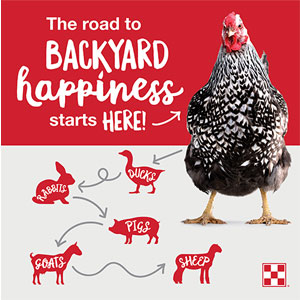
Hobby Farm Ideas: Expanding Beyond Backyard Chickens
Starting a Flock : Considering Chickens
Flock Management : Egg Benefits
Flock Management : Egg Production
Backyard chickens are often called the gateway animal to starting a hobby farm or the homesteading lifestyle. It’s because you start with a few cute baby chicks and before you know it, you’ve added ducks, goats and a couple pigs to your backyard farm!
If you’re a backyard chicken enthusiast, expanding your flock may be a great first step toward starting your hobby farm. We call this “chicken math” where one chick plus one chick equals a lot of chickens! Adding more chickens to the coop will provide you with more eggs, meaning you could start earning income from selling extra eggs.
Consider expanding your flock with breeds that lay different colored eggs. Or you might want to add a rooster so you’ll have fertilized eggs to hatch at home. Keep the chicks for your flock or give them to neighbors and family members who want backyard chickens.
There’s also advanced chicken math, where you expand your flock by adding different poultry species:
Visit our backyard poultry page for our top recommendations for feeding all your birds.
 feed greatness to all your hobby farm animals. This quick guide provides helpful tips and resources when expanding your backyard farm.
feed greatness to all your hobby farm animals. This quick guide provides helpful tips and resources when expanding your backyard farm.
Ready to start your dream backyard farm or hobby farm? Learn from our experts by signing up for our monthly management tips.
If you’re a backyard chicken enthusiast, expanding your flock may be a great first step toward starting your hobby farm. We call this “chicken math” where one chick plus one chick equals a lot of chickens! Adding more chickens to the coop will provide you with more eggs, meaning you could start earning income from selling extra eggs.
Consider expanding your flock with breeds that lay different colored eggs. Or you might want to add a rooster so you’ll have fertilized eggs to hatch at home. Keep the chicks for your flock or give them to neighbors and family members who want backyard chickens.
There’s also advanced chicken math, where you expand your flock by adding different poultry species:
 Broiler chickens or meat birds are quick and easy to raise, providing delicious meat for your family. They’re typically raised to about 6 pounds and are processed between 6 and 8 weeks of age.
Broiler chickens or meat birds are quick and easy to raise, providing delicious meat for your family. They’re typically raised to about 6 pounds and are processed between 6 and 8 weeks of age.- Turkeys require a little more work than backyard chickens, but they also reward your efforts with great tasting eggs and meat. They’ll need a spacious outdoor area and predator-proof fencing for nighttime protection.
- Ducks and geese help control insects and weeds and make wonderful animal companions. They also lay delicious eggs! Your ducks and geese will be happiest with a grassy area to roam and a pond or pool to swim in.
- Quail and other game birds require good ventilation and plenty of space per. Game birds can be raised for meat or for release programs.
- Peacocks and pheasants need a spacious coop and run, plus tall roosts to accommodate their long tail feathers, which can reach up to 5 feet long. They love gardens in their flight pens with tall grasses, evergreens and perennial plants.
Visit our backyard poultry page for our top recommendations for feeding all your birds.
Choosing your hobby farm animals
Once you have some practice with poultry, there are so many great hobby farm animals to choose from. Where do you go next? These questions might help narrow down your options and find the best animals based on your goals and space:- What are your animal goals? Do you want to raise food? Or add more animal companions? Be realistic with your goals for raising more animals.
- What animals are allowed in your neighborhood? We can’t stress this enough – learn your local ordinances for raising animals before bringing any home. Here are some good questions to ask when talking to city officials about adding any animals to your hobby farm.
- How much space do you have? A starter flock of backyard chickens takes very little space in your backyard. A horse or herd of goats will take up much more! Consider small- to medium-sized animals if you have a smaller space for raising them.
- How much time do you have? The more animals you add to your backyard farm, the more time it will take to care for them.
- How sturdy are your fences? The poet Robert Frost said it best, “Good fences make good neighbors.” Sturdy, strong fences will keep your animals safe and your neighbors happy. Some animals, like escape artist goats, will put your building skills to the test.
- How much are you willing to spend raising animals? Besides the purchase cost, your new hobby farm animals will need feed, equipment, bedding and occasional visits from veterinarians. Talk to friends or neighbors who have hobby farms and get a sense of what they’re spending each year.
- Do your neighbors know about your hobby farm plans? Animals bring fun, companionship, and delicious fresh products, but also added noise, smells and flies. Discuss your plans with neighbors and be proactive about addressing their worries. It never hurts to share your farm bounty with them, either!
Quick guide to popular hobby farm animals
There are Purina animal experts to help you feed greatness to all your hobby farm animals. This quick guide provides helpful tips and resources when expanding your backyard farm.
feed greatness to all your hobby farm animals. This quick guide provides helpful tips and resources when expanding your backyard farm.Rabbits
Backyard rabbits are similar to chickens because they don’t require a lot of time, space or money to raise. They’re great for pets, club projects, wool or meat. Feed them a complete rabbit feed, like Purina® Complete Rabbit Feed with a balance of protein, fiber and essential nutrients for rabbits of all ages.Goats
Goat milk. Goat cheese. Goat soap. Backyard goats are fun to raise and provide so many great products your family can use. Make feeding time simple with Purina® Goat Chow® Goat Feed – it’s research-proven for the health and vitality of all breeds of goats and for all life stages. Goats also need good quality roughage (grasses or grass hay) each day. The biggest challenge of goats is building a backyard area they can’t escape!Horses
Horses are big animals that need plenty of space to exercise, a strong shelter to protect them and plenty of pasture or hay. Feeding a horse typically starts with high-quality forages. If hay or pasture is limited or not available, choose a Purina® complete horse feed.Pigs
Pigs are remarkably smart and personable animals. They’ll provide companionship or delicious pork. Purina® Nature’s Match® pig feed line was created specifically for hobby farms. Choose the right formula based on your pig’s life stage. One warning about raising pigs: they create a lot of manure, and your neighbors might not enjoy the smell! A 200-pound pig can produce nearly 10 pounds of manure a day. Plan to compost their waste or find a commercial composter to take it.Ready to start your dream backyard farm or hobby farm? Learn from our experts by signing up for our monthly management tips.





